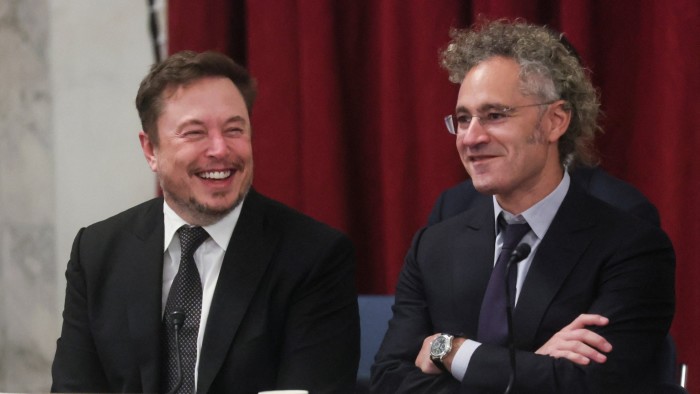Unlock the White House Watch newsletter for free
Your guide to what Trump’s second term means for Washington, business and the world
The writer is a fellow at Stanford University’s Institute for Human-Centered Artificial Intelligence and the Cyber Policy Center. She is the author of ‘The Tech Coup’
Palantir chief executive Alex Karp self-identifies on the “populist-left,” backed Kamala Harris in the US presidential election and once complained that co-founder Peter Thiel’s support for President Donald Trump made his work harder. Despite his conspicuous absence from the inauguration, Karp has emerged as an unlikely cheerleader for the new administration.
In recent months, Karp has fallen in lockstep with Elon Musk, calling him the most “qualified person in the world” to remake the US government. It helps that the Doge vision for America bears a great resemblance to that of Palantir.
Like Doge, the head of the US software company has an idealised vision of America as a beacon of western democracy. However, this bears little resemblance to the current reality.
The contradiction appears most stark regarding US support for Ukraine. When Russia invaded the country in 2022, Palantir rapidly deployed its data analytics services to support the Ukrainian government under siege, pro bono. The company proudly showcases these efforts on its website, highlighting the tactical advantages its technology provides to Ukrainian forces. Yet in recent months, President Trump has drastically cut vital support for Ukraine, publicly humiliated President Volodymyr Zelenskyy, and turned his back on European partners.
Consider also the controversial detention of international students protesting against Israeli military actions in Gaza. Karp, who has long counted Immigration and Customs Enforcement (ICE) as a Palantir customer, condemned the protests while saying nothing about the crackdown on the students involved.
On artificial intelligence, Karp maintains a consistently hawkish position. “We must not, however, shy away from building sharp tools for fear they may be turned against us,” he wrote two years ago. He went on to say that free and democratic societies need more than moral appeal: they require hard power. But what happens to those sharp tools in the absence of checks and balances?
In his new book The Technological Republic, Karp writes that the tech sector wastes time and talent by developing trivial social media and shopping apps instead of more consequential services. I share this critique that Silicon Valley has lost its way. I also agree with him that many companies fail to take responsibility or action to support democracy.
But Trump, with the help of tech leaders, is rapidly making the US less liberal and less democratic. Anyone who supports the west and the rule of law should feel compelled to speak out against this; to draw consequences from the loss of American alliance with other western nations such as those in Europe; or to go on the offensive and challenge the very government that is aggressively undermining the west from within.
With numerous alumni now serving in the Trump administration, Palantir wields significant influence. Yet despite positioning the company as an industry outlier and criticising other tech leaders, Karp seems to be going along to get along. Government contracts remain a crucial revenue stream, and Palantir stock has climbed considerably since Trump’s re-election.
During an earnings call in February, he told analysts that “whatever is good for America will be good for Americans and very good for Palantir”. But for Palantir’s non-American clients, this unabashed alignment with narrowly defined US state interests may prompt serious reconsideration of their relationships with the company. It’s one thing to talk about defending democratic western values, it’s quite another to do it.
